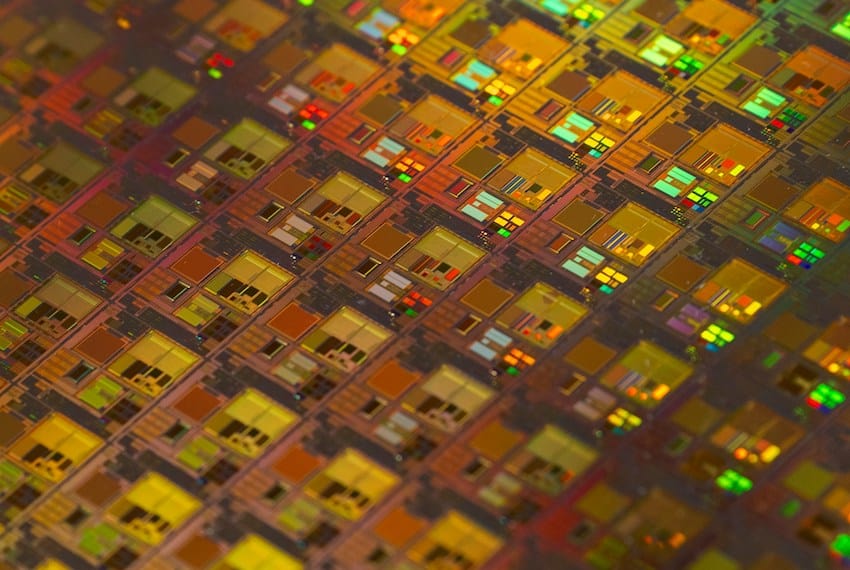With the troop deployment process at the northern border proceeding smoothly and U.S. tariff threats momentarily shelved, President Claudia Sheinbaum turned her attention back to economic development issues.
During her Thursday morning press conference, Sheinbaum presented a new initiative for the development of semiconductors, announcing plans to make Mexico’s industry a key player in the design and manufacturing of the building blocks of modern electronics.

The president also said she has asked her Cabinet to address the constitutionality of the proposed ban on genetically modified corn, mentioned that the country’s patent process will be simplified, and claimed that the U.S. Drug Enforcement Administration (DEA) will not have greater freedom to operate in Mexico.
Making Mexico a semiconductor power player
Sheinbaum unveiled the Kutsari Project, the main objective of which is the development of a National Semiconductor Design Center. The project will be managed by the new Sciences, Humanities, Technology and Innovation Ministry.
Minister Rosaura Ruiz said the first phase of the initiative will be to establish a cutting-edge design center, leveraging the extensive expertise of Mexican talent.
Essential for the operation of electronic devices such as computers, mobile phones, televisions, automobiles and home appliances, semiconductors enable the manufacturing of integrated circuits or “chips,” the essence of most modern technological devices.

The development of the project will be led by top-tier academic institutions and research centers, including the National Institute of Astrophysics, Optics, and Electronics (INAOE), the Center for Research and Advanced Studies (Cinvestav), the National Autonomous University (UNAM) and the National Polytechnic Institute (IPN).
Mexico currently imports more than US $20 billion worth of integrated circuits annually, primarily for the automotive, medical device, home appliance and information technology industries.
The goal will be to reduce the dependency on exported “chips” while strengthening Mexico’s participation in the global semiconductor supply chain.
Sheinbaum lauded the extensive research being carried out in Mexico, saying Ruiz will be tasked with coordinating efforts to turn that research into marketable, high-value products.

Future decisions will determine what type of manufacturing plant should be built (public, private or mixed enterprise) with the goal of completing an assembly plant by 2030.
Semiconductor plan will prompt patent reform
Recognizing that the semiconductor industry could become a strategic sector in Mexico’s economy, Civil Service Minister Raquel Buenrostro said it will be important to simplify the patent process.
Buenrostro pointed out that Mexican scientists and domestic industries don’t patent in Mexico “because current patent law does not meet international standards.”
She said that there are currently 427 patent applications (84 submitted by Mexicans) related to semiconductors and 148 pending semiconductor registrations (28 submitted by Mexicans).
Santiago Nieto, the director of the Mexican Institute of Industrial Property, said the reform being prepared will streamline the process and encourage the development of domestic technology.
Addressing GMO corn controversy
The Sheinbaum administration will soon meet with members of the U.S.-Mexico-Canada trade agreement (USMCA) panel to discuss the ruling that declared Mexico’s 2020 presidential decree banning genetically modified (GMO) seeds in Mexico violated the USMCA and lacked scientific merit.
#EnLaMañanera | Sobre el panel que México perdió en el #TMEC, acerca del maíz transgénico, la presidenta Sheinbaum confirmó que habrá una reunión con Agricultura, Medio Ambiente y especialistas de la organización ‘Sin Maíz No Hay País’ para analizar una nueva reforma pic.twitter.com/HRvDuAhd9H
— El Financiero (@ElFinanciero_Mx) February 6, 2025
The Economy Ministry on Wednesday formally overturned the presidential decree that sought to prohibit the importation of GMO corn, publishing a redaction in the Official Gazette.
Ahead of the discussions, Sheinbaum asked Mexico’s Agriculture Ministry, Environment Ministry and members of the organization Sin Maíz No Hay País (Without Corn There is No Country) to consider a new decree that would prohibit the cultivation of genetically modified corn in Mexico.
The stated idea, Sheinbaum says, is to protect Mexico’s biodiversity and preserve corn as both a cultural symbol and a nutritional staple.
Restrictions on DEA remain in place
Upon being asked by a reporter if the DEA will have a greater role as Mexico ratchets up its drug interdiction efforts, Sheinbaum responded in the negative.
“No, there will always be coordination within the framework of our country’s sovereignty,” she said, but the DEA will not reinforce its presence in Mexico.
The question was prompted by Sheinbaum’s account of the phone chat between Mexican Foreign Minister Juan Ramón de la Fuente and U.S. Secretary of State Marco Rubio, in which the two discussed how to stem the flow of fentanyl and precursor chemicals from China into Mexico.
“Why would I ask for a greater presence for the DEA?” she said. “We are talking about cooperation.”
The DEA had a turbulent relationship with Sheinbaum’s predecessor, Andrés Manuel López Obrador, and there are reports that the DEA has conducted investigations into López Obrador’s alleged ties with drug traffickers.
Mexico News Daily
